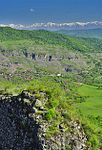| Revision as of 06:04, 14 December 2012 editSchreiberBike (talk | contribs)Autopatrolled, Extended confirmed users, Pending changes reviewers310,475 edits Fix centuries to match WP:CENTURY.← Previous edit | Revision as of 07:49, 4 January 2013 edit undoBgwhite (talk | contribs)Extended confirmed users547,151 editsm Fix isbn using AWB (8843)Next edit → | ||
| Line 38: | Line 38: | ||
| ==Architecture== | ==Architecture== | ||
| The fortress was an important fortification of the medieval Armenian ] that thrived in the High Middle Ages <ref>Bonnie Marshall. The Flower of Paradise and Other Armenian Tales (World Folklore Series). 2007. photo section</ref> and is located at a height of more than 1700 meters, surrounded by vertical limestone cliffs with the heights of 50–60 meters, has a hard-to-reach entrance from the southern side of the fortress. During its history no one could ever storm the fortress. Parts of the defensive walls remain standing. |
The fortress was an important fortification of the medieval Armenian ] that thrived in the High Middle Ages <ref>Bonnie Marshall. The Flower of Paradise and Other Armenian Tales (World Folklore Series). 2007. photo section</ref> and is located at a height of more than 1700 meters, surrounded by vertical limestone cliffs with the heights of 50–60 meters, has a hard-to-reach entrance from the southern side of the fortress. During its history no one could ever storm the fortress. Parts of the defensive walls remain standing.<ref>Boris Baratov. Paradise Laid Waste: A Journey to Karabakh, Lingvist Publishers, Moscow, 1998, pp. 50</ref> | ||
| The territory of the fortress occupies a large area, though it seems small. Many rooms, secret passages cut into the cliffs, and special "]s" for throwing stones at enemies are inside its territory. |
The territory of the fortress occupies a large area, though it seems small. Many rooms, secret passages cut into the cliffs, and special "]s" for throwing stones at enemies are inside its territory.<ref>Shahen Mkrtchian. Historical and Architectural Monuments of Nagorno-Karabakh. pp. 10, 21, 25. Yerevan, 1989, in Russian. Original: Шаген Мкртчян. Историко-архитектурные памятники Нагорного Карабаха. стр. 10, 21, 25. Ереван, 1989</ref> The water supply problem was solved by a unique method: two rock-cut reservoirs to store rain and melt-water are in the center of the fortress. Fresh water was brought from a spring at the foot of the mountain.<ref>Brady Kiesling (Author), Raffi Kojian (Author, Editor). Rediscovering Armenia. Publisher: Matit; 2nd edition (June 1, 2005), ISBN 9994101218; ISBN 978-9994101214</ref> | ||
| ==Etymology== | ==Etymology== | ||
| ''Kachaghakaberd'' is translated from Armenian as ''magpie's fortress'', a combination of the words կաչաղաք (''kachaghak'', designating the bird ]) and բերդ (''berd'', meaning fortress). |
''Kachaghakaberd'' is translated from Armenian as ''magpie's fortress'', a combination of the words կաչաղաք (''kachaghak'', designating the bird ]) and բերդ (''berd'', meaning fortress).<ref>Brady Kiesling (Author), Raffi Kojian (Author, Editor). Rediscovering Armenia. Publisher: Matit; 2nd edition (June 1, 2005), ISBN 9994101218; ISBN 978-9994101214</ref><ref>Shahen Mkrtchian. Historical and Architectural Monuments of Nagorno-Karabakh. pp. 10, 21, 25. Yerevan, 1989, in Russian. Original: Шаген Мкртчян. Историко-архитектурные памятники Нагорного Карабаха. стр. 10, 21, 25. Ереван, 1989</ref> | ||
| ==Gallery== | ==Gallery== | ||
| Line 57: | Line 57: | ||
| </gallery> | </gallery> | ||
| </center> | </center> | ||
| ⚫ | ==References== | ||
| ⚫ | {{reflist}} | ||
| ==See also== | ==See also== | ||
| Line 67: | Line 64: | ||
| * ] | * ] | ||
| * ] | * ] | ||
| ⚫ | ==References== | ||
| ⚫ | {{reflist}} | ||
| {{Armenian Fortresses}} | {{Armenian Fortresses}} | ||
Revision as of 07:49, 4 January 2013
| Կաչաղակաբերդ | |
 | |
| Location | Nagorno-Karabakh |
|---|---|
| Type | Fortress, in the Principality of Khachen |
| Completion date | 9th century |
Kachaghakaberd (Template:Lang-hy) is a mountain-top fortress in the Martakert Province of the unrecognized Nagorno-Karabakh Republic within Azerbaijan, where it lies in the Tartar Rayon.
Architecture
The fortress was an important fortification of the medieval Armenian Principality of Khachen that thrived in the High Middle Ages and is located at a height of more than 1700 meters, surrounded by vertical limestone cliffs with the heights of 50–60 meters, has a hard-to-reach entrance from the southern side of the fortress. During its history no one could ever storm the fortress. Parts of the defensive walls remain standing.
The territory of the fortress occupies a large area, though it seems small. Many rooms, secret passages cut into the cliffs, and special "loopholes" for throwing stones at enemies are inside its territory. The water supply problem was solved by a unique method: two rock-cut reservoirs to store rain and melt-water are in the center of the fortress. Fresh water was brought from a spring at the foot of the mountain.
Etymology
Kachaghakaberd is translated from Armenian as magpie's fortress, a combination of the words կաչաղաք (kachaghak, designating the bird magpie) and բերդ (berd, meaning fortress).
Gallery
See also
References
- "Качагакаберд".
- "Качагакаберд (крепость)".
- Bonnie Marshall. The Flower of Paradise and Other Armenian Tales (World Folklore Series). 2007. photo section
- Boris Baratov. Paradise Laid Waste: A Journey to Karabakh, Lingvist Publishers, Moscow, 1998, pp. 50
- Shahen Mkrtchian. Historical and Architectural Monuments of Nagorno-Karabakh. pp. 10, 21, 25. Yerevan, 1989, in Russian. Original: Шаген Мкртчян. Историко-архитектурные памятники Нагорного Карабаха. стр. 10, 21, 25. Ереван, 1989
- Brady Kiesling (Author), Raffi Kojian (Author, Editor). Rediscovering Armenia. Publisher: Matit; 2nd edition (June 1, 2005), ISBN 9994101218; ISBN 978-9994101214
- Brady Kiesling (Author), Raffi Kojian (Author, Editor). Rediscovering Armenia. Publisher: Matit; 2nd edition (June 1, 2005), ISBN 9994101218; ISBN 978-9994101214
- Shahen Mkrtchian. Historical and Architectural Monuments of Nagorno-Karabakh. pp. 10, 21, 25. Yerevan, 1989, in Russian. Original: Шаген Мкртчян. Историко-архитектурные памятники Нагорного Карабаха. стр. 10, 21, 25. Ереван, 1989
| Historical Armenian fortresses and castles | |
|---|---|
| Armenia | |
| Azerbaijan | |
| Turkey | |
Category:






